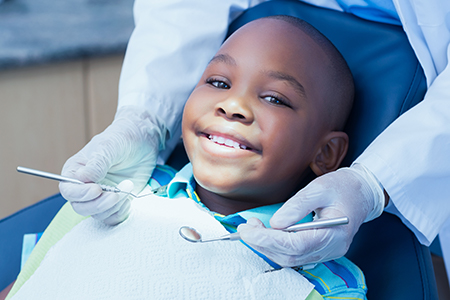New Patients
(732) 813-3564
Existing Patients
(732) 639-3495

At the office of Elegant Dental Arts, we prioritize the long-term health and confidence of your child’s smile. Our pediatric dentistry services are designed to support healthy habits, guide development, and address concerns early so children can grow into strong, comfortable smiles.

Healthy dental habits begin long before a child loses their first tooth. Starting with gentle education for parents and age-appropriate care for infants and toddlers, we focus on prevention and early intervention. By establishing a routine of regular oral checks and positive experiences at the dentist, children are more likely to maintain those habits into adolescence and adulthood.
Our approach balances evidence-based preventive care—such as cleanings, fluoride as appropriate, and sealants when indicated—with practical guidance for daily home care. We teach parents how to clean emerging teeth, reduce cavity risk, and make oral hygiene a normal, stress-free part of everyday life for the whole family.
We also emphasize a welcoming atmosphere. Children respond best when staff communicate clearly, explain procedures in simple terms, and use techniques designed to reduce fear. Creating calm, positive visits helps children build trust in dental care, which pays dividends throughout their lives.

Regular dental exams are more than a cleaning appointment; they’re checkpoints for growth and development. At each visit, we evaluate teeth, gums, jaw alignment, and bite function to identify early signs of decay, misalignment, or other issues that can affect development. Catching concerns early often means simpler, less invasive care later on.
Dental visits also provide an opportunity to discuss nutrition, oral habits, and injury prevention. Our team will review your child’s medical history, note any risk factors, and recommend a personalized plan to maintain oral health between visits. When x-rays are needed, we use modern digital imaging to minimize exposure while obtaining the detail required for accurate assessment.
Professional cleanings remove plaque and buildup in areas children may miss while brushing, and they help reduce the chance of cavities and gum irritation. These appointments also let us reinforce healthy techniques and make adjustments as your child grows and their needs change.
Tooth decay remains one of the most common conditions affecting children, but it is largely preventable. We prioritize preventive measures—like individual fluoride guidance, sealants on vulnerable chewing surfaces, and behavioral strategies to lower sugar exposure—that reduce the risk of cavities and preserve healthy enamel.
We work with families to identify habits and foods that raise risk, and offer practical alternatives that support overall health. Simple changes in snacking, drink choices, and consistent oral care routines often have a dramatic impact on a child’s dental trajectory.
Start dental visits early to build familiarity and a positive routine
Clean baby teeth and gums gently from the first tooth, and move to an age-appropriate brush and toothpaste as recommended
Avoid letting infants fall asleep with a bottle of milk or juice to prevent prolonged exposure to sugars
Schedule routine checkups and professional cleanings at intervals recommended by your dentist
Model good brushing and flossing habits so children learn by example
Choose nutrient-rich snacks and limit sugary drinks—water is the best option between meals
Support transitions away from pacifiers and thumb-sucking when developmentally appropriate
Use a properly fitted mouthguard for contact sports to protect teeth and supporting tissues

The foundations of oral health take shape very early. Many primary teeth begin to appear in the first year of life, and that early period is an ideal time to establish care patterns. Professional guidance helps parents know when to start brushing, how much toothpaste to use, and when to introduce dental visits in a way that’s comfortable for the child.
Guidance for teething, safe soothing techniques, and tips to minimize common challenges are all part of routine pediatric visits. We help families recognize normal developmental milestones and provide reassurance or intervention when something looks out of the ordinary.
Protecting primary teeth matters because they enable eating, speech development, and provide critical space maintenance for permanent teeth. Addressing decay or trauma to baby teeth promptly reduces the risk of complications and helps children stay healthy and comfortable.
Children respond best to dental care when it’s delivered with patience and clear communication. Our team uses child-centered language, step-by-step explanations, and behavior guidance techniques to make appointments productive and calm. We strive to create a setting where questions are welcomed and every child feels heard.
For children with anxiety, medical conditions, or special needs, we discuss individualized strategies to make treatment safe and effective. Options range from scheduling adjustments to sedation alternatives when appropriate; decisions are made collaboratively with parents to ensure comfort and clinical safety.
Education is also a core element of our visits. We provide age-appropriate instruction so children learn why oral care matters and how to take responsibility for their teeth as they grow. Empowering kids with knowledge builds confidence and reduces fear over time.
As children transition to school age and the teen years, their oral health needs change. We continuously monitor facial growth, tooth eruption, and bite relationships to identify when orthodontic assessment or intervention might be beneficial. Timely recommendations can simplify future care and improve long-term function.
Adolescence often brings new dietary habits, sports participation, and social concerns about appearance. We partner with families to provide guidance on nutrition, protective mouthgear, and preventive treatments like sealants to guard permanent molars once they emerge.
Our team also stays vigilant for signs of trauma, infection, or other urgent conditions. When emergencies arise, prompt assessment and compassionate management help reduce complications and restore comfort.
Certain situations call for more specialized attention. If a child has persistent pain, repeated infections, premature tooth loss, or evident changes in jaw growth, early referral to a pediatric dental specialist or an orthodontist may be recommended. Acting sooner often simplifies care and improves outcomes.
We work collaboratively with other specialists when complex needs arise, coordinating care to avoid unnecessary delays and to maintain a consistent, child-focused approach. Families benefit from clear explanations of options and what to expect at each step.
Decisions about interceptive treatment, space maintainers, or appliance therapy are made on an individualized basis, informed by growth patterns and the child’s overall health. Our priority is to recommend only the care that will meaningfully support a healthy, functional smile.
In summary, pediatric dentistry is about prevention, timely care, and supportive education—helping children develop healthy habits and protecting smiles through every stage of growth. If you have questions or would like more information about our pediatric dental services, please contact us for assistance.
A pedodontist is a dentist who has received advanced specialty training in meeting the dental needs of children from infancy to adolescence. Pedodontists, also referred to as "pediatric dentists," study child psychology, behavior management, caring for children with special needs, methods of handling oral/facial trauma, and various techniques for providing anesthesia and sedation. Pedodontists also understand the complexities of facial growth and development and have the clinical skills required to meet the dental needs of all children at every stage of development. Most of all, pedodontists are passionate about what they do and enjoy working with children. They strive to make every dental experience a positive one as they help children establish a strong foundation for good oral health.
Even before your child is born, their first set of teeth is already forming. In fact, by one year of age, some of your baby's front teeth will have already come into place. While the arrival of your baby's first teeth is only one of many developmental milestones, it represents an excellent time to begin a program of oral care. According to recommendations from the American Dental Association, babies should see the dentist around the time of their first birthdays.
Your baby's first teeth typically begin to appear in the 6 to 12-month range. While this is an extraordinary milestone, you need to be aware that your baby may find the experience a little bit uncomfortable. Teething can make babies feel irritable. They may be fussy, have trouble sleeping, not want to eat, and drool quite a bit.
Although you are powerless to speed up the process of teething, there are a few things that you can do to soothe your baby as the new teeth are erupting into place. Common approaches to helping your baby feel more comfortable while getting new teeth, include teething rings or a cold spoon or moist gauze rubbed over their gums.
Even for these few new teeth, it's absolutely essential to establish an effective regimen of oral care. For information on when your baby's first set of teeth will erupt into place, consult this timeline from the American Dental Association: Eruption Charts
Some children persist in sucking their thumbs or fingers beyond their preschool years. For these children, the activity continues to be a source of comfort, relaxation, and security. It may even help them fall asleep at night. However, it's essential to be aware that in the long-term, a finger sucking habit is not healthy.
If your child's thumb or finger sucking habit is still present when the permanent teeth begin to come in, your child is at a higher risk of developing a bad bite. By the age of five or six years, you need to constructively and gently help your child stop the habit.
It's also a good idea to have a comprehensive evaluation at this time. Your pedodontist can assess if there are any habit related alterations to the alignment of your child's teeth or jaws, or if it is affecting their speech or swallowing patterns. They can also discuss habit control strategies with you, as well as follow your child's bite and facial development as they grow. If interceptive appliances or corrective orthodontic care are recommended, the timetable and best options in care will be explained in complete detail.
Your child should see a dentist by their first birthday or within six months of the first tooth emerging. Early visits allow the dental team to assess development, check for early signs of decay, and advise parents on feeding and cleaning routines that protect baby teeth. Introducing dentistry early helps establish a positive relationship with oral care and reduces fear at later visits.
During the initial appointment the dentist focuses on education and gentle assessment rather than invasive treatment. Parents receive guidance on cleaning techniques, teething comfort measures, and strategies to reduce sugar exposure. This foundation makes it easier to maintain healthy habits as the child grows.
Preventing cavities starts with consistent daily oral care and mindful feeding practices. Brush emerging teeth twice daily with an age-appropriate brush and a smear or pea-sized amount of fluoride toothpaste as recommended, and avoid prolonged exposure to sugary liquids such as juice or milk at nap time. Limiting frequent snacking on sticky or high-sugar foods and encouraging water between meals also lowers cavity risk.
Professional prevention plays a key role alongside home care, including regular cleanings, risk assessment, and preventive treatments when appropriate. Sealants can protect chewing surfaces of permanent molars once they erupt, and individualized fluoride guidance helps strengthen enamel. The dentist and hygienist will work with families to tailor a prevention plan based on each child’s needs.
A pediatric dental exam at the office of Elegant Dental Arts begins with a calm, child-centered evaluation of the teeth, gums, and bite. The visit typically includes an oral cancer and soft tissue check, an assessment of eruption patterns and jaw growth, and a cleaning to remove plaque and buildup in areas children may miss. When necessary, modern digital x-rays are used to gather detailed information while minimizing exposure.
Exams also include practical education for parents and children about brushing, flossing, diet, and injury prevention. The team will discuss any findings, outline recommended steps for care, and create a follow-up plan tailored to the child’s developmental stage. The overall goal is to catch issues early and to make each visit a positive learning experience.
Managing dental anxiety begins with communication, patience, and predictable routines that reduce uncertainty for children. Staff use child-friendly language, demonstrate procedures step by step, and employ behavior guidance techniques such as tell-show-do to build trust and cooperation. Creating a welcoming environment and allowing time for questions helps children feel heard and more in control.
For children with higher levels of anxiety or special medical needs, the team discusses individualized strategies that may include scheduling adjustments, longer visits to allow acclimation, or use of mild sedation when clinically appropriate. Parents are involved in decision-making so that comfort and safety remain the top priorities while ensuring effective treatment.
Yes. When applied appropriately, fluoride treatments and dental sealants are safe and effective tools for preventing tooth decay in children. Fluoride strengthens enamel and can be administered as topical applications during professional cleanings to reduce cavity risk, while sealants are a thin protective coating placed on the chewing surfaces of molars to block bacteria and food particles.
The dental team recommends these preventive measures based on each child’s risk factors, age, and eruption patterns. Parents receive clear information about the benefits and any possible side effects so they can make informed choices that support long-term oral health.
Most children benefit from dental checkups every six months, but frequency can vary depending on individual risk factors such as past decay, orthodontic concerns, or special medical conditions. Regular visits allow the dentist to monitor growth, evaluate eruption of permanent teeth, and adjust preventive strategies as needs change. Routine cleanings remove plaque and help reinforce home care habits for both children and parents.
The office of Elegant Dental Arts works with families to set a recall schedule based on each child’s oral health and developmental stage. If a child is at higher risk for cavities or has ongoing treatment needs, more frequent monitoring may be recommended to provide timely intervention and simpler care when problems are detected early.
In cases of dental trauma, prompt action can improve the likelihood of saving the tooth and reducing complications. For a knocked-out permanent tooth, attempt to reinsert it gently if possible or keep it moist in milk or saline and seek emergency dental care immediately. For chipped teeth or injuries to baby teeth, contact the dentist promptly for assessment since treatment needs differ by tooth type and age.
After an injury the dental team will evaluate for soft tissue damage, signs of infection, or changes in bite, and recommend follow-up monitoring or treatment as needed. Parents should also observe the child for persistent pain, swelling, or changes in color or mobility of the injured tooth and report these findings to the dentist without delay.
Pediatric dentists play a central role in monitoring facial growth, tooth eruption, and jaw relationships to identify early indicators that orthodontic evaluation may be beneficial. Regular exams include assessment of bite alignment, crowding, and habits such as thumb-sucking that can influence development. Detecting concerns during childhood can allow for interceptive measures that simplify future orthodontic work and improve functional outcomes.
When orthodontic issues are suspected, the dental team discusses timing and options, which may include referral to an orthodontist for a consultation. Decisions about appliances or interceptive treatment are individualized and based on growth patterns, oral health, and the child’s overall health to recommend care that supports a healthy, functional smile.
Families can reinforce oral health by establishing consistent brushing and flossing routines, modeling good technique, and making dental care a normal part of daily life. Use an age-appropriate toothbrush and fluoride toothpaste, supervise brushing until children can effectively clean on their own, and replace brushes regularly. Limiting sugary snacks and encouraging water between meals helps protect enamel and reduces cavity risk.
Other helpful steps include avoiding bottles with sugary liquids at bedtime, encouraging timely transitions away from pacifiers or thumb-sucking when developmentally appropriate, and ensuring a properly fitted mouthguard for sports. Regular communication with the dental team about diet, habits, or any concerns helps families adapt routines as children grow.
Children should wear a mouthguard whenever they participate in contact or collision sports, starting as soon as they begin organized activity. A properly fitted mouthguard reduces the risk of tooth fractures, soft tissue injuries, and jaw trauma. Over-the-counter options offer some protection, but custom-fitted mouthguards made by a dental professional provide superior fit, comfort, and retention.
The dental team can assess the child’s dental development and take impressions or digital scans to create a custom mouthguard that accommodates growth and existing appliances like braces. Parents should replace the mouthguard as the child’s mouth changes or if the guard becomes worn to maintain optimal protection during play.

